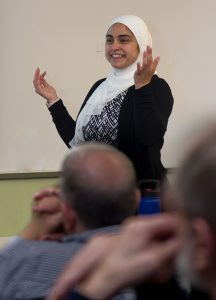Khadijeh Alnajjar, Ph.D., ’14, grew up in Jordan. She came to Dayton to be with her family and felt welcomed at Wright State University, where she spent nearly 10 years as a student. She earned a bachelor’s degree in chemistry, followed by a Ph.D. in biomedical sciences in the Department of Biochemistry and Molecular Biology (BMB) at Wright State.
“I wouldn’t be where I am right now without all the mentors that I’ve had and all the amazing people here. I wouldn’t know what I know if it wasn’t for the excellent mentors I’ve had through all my years of education,” Alnajjar said. “I consider myself very lucky and I’m eternally thankful for everybody who has helped me.”
She would routinely eat lunch in the briefing room of Diggs Laboratory, plan her experiments and discuss her laboratory results with Wright State professors and peers. Alnajjar connected with many of her mentors in the Department of Biochemistry and Molecular Biology, including Lawrence Prochaska, Ph.D., and Gerald Alter, Ph.D., emeritus professors, and Madhavi Kadakia, Ph.D., professor and chair of the department.

Khadijeh Alnajjar gave a seminar presentation to students and faculty in the Department of Biochemistry and Molecular Biology.
After leaving Wright State, Alnajjar’s next position was at Yale University, where she worked as a postdoctoral associate in the laboratory of Joann Sweasy, Ph.D. Now a researcher in Sweasy’s new laboratory at the University of Arizona College of Medicine Cancer Center, Alnajjar helps to uncover the contributions to cancer of a significant enzyme involved in DNA synthesis.
Her research on the enzyme, known as DNA polymerase beta, was the subject of a recent seminar presentation she gave to students and faculty in the Department of Biochemistry and Molecular Biology. Alnajjar shared some of her research findings and gave advice to the students.
“Mentors are not hard to find at Wright State. Find as many mentors as you can,” she told students. “It’s also important to know that there are failures. Many failures have happened during my time, but it’s overwhelming when you see positive results. And they will come.”
Alnajjar’s research into polymerase beta is one of those success stories. She is researching how mutations in this enzyme affect its function, since mutated forms of this enzyme are found in about 40 percent of colorectal cancers.
She has found that the variant polymerase beta makes errors during DNA synthesis that contribute to colorectal cancer. The questions she seeks to answer next are the disease-causing pathways that take place as cancerous tissue develops after the enzyme’s mutations. Results of her studies were recently published in biochemical and biomedical literature.

 Wright State psychology team studies ways to identify fatigue in pilots, drivers
Wright State psychology team studies ways to identify fatigue in pilots, drivers  Wright State videographer Kris Sproles wins Regional Emmy and Ohio journalism award
Wright State videographer Kris Sproles wins Regional Emmy and Ohio journalism award  Wright State Boonshoft School of Medicine ranked among the nation’s best for 2024 by U.S. News
Wright State Boonshoft School of Medicine ranked among the nation’s best for 2024 by U.S. News  Exposing biotechnology
Exposing biotechnology  Wright State faculty member Dan Noel uses unique background to inspire new leaders
Wright State faculty member Dan Noel uses unique background to inspire new leaders 